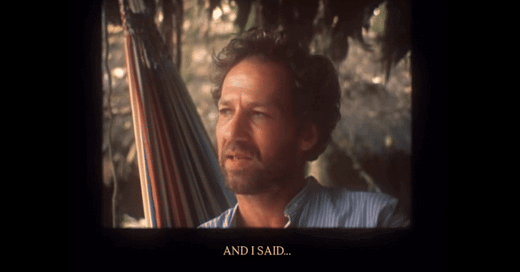“You must live life in its very elementary forms. The more you take it as it comes, with all its hardships, the more you find inspiration in it. I’m not an artist. I’m a soldier. I have to fight, I have to conquer, I have to go on, I do not retreat.”
— Werner Herzog
Werner Herzog is be the anti–nepo baby archetype. He is famously self-made, almost mythically so: no Hollywood lineage, no inherited privilege — just raw willpower. He once walked from Munich to Paris when a friend was dying. He stole his first film camera from a film school (later claiming he felt entitled to it because no one was using it). He made Aguirre, the Wrath of God on a shoestring in the Amazon with a mutinous cast.
Herzog’s entire ethos is built on radical self-reliance and vision, often brushing up against madness — but always in pursuit of something deeply human and sublime. He’s the kind of filmmaker who teaches you that if no one gives you permission, you give it to yourself.
8 Ways to Cultivate Unhinged Bravery in Werner Herzog style
We trace eight wild moments from Werner Herzog’s life to explore how he embodied a fierce, unhinged kind of bravery — and what each act of boldness can teach us about how to live and create with conviction.
1. Silence and Solitude
Herzog was born in Munich in 1942, during an air raid. Shortly after, his mother fled with him and his two brothers to the mountains — to a remote village called Sachrang, near the Austrian border. The war was still burning. She wanted them out of the way of bombs. There was no running water. No electricity. No phone. No cinema. No noise.
Herzog has spoken often about this silence and how formative it was:
“We were in the mountains of Bavaria, in a very remote place. There was no running water, no flushing toilet, no television, no telephone, no radio, no newspapers, no cinema. It was a life filled with incredible hardship. But it was a very good start in life, radical and formative beyond what we can imagine today.”
— Werner Herzog
This wasn’t romantic solitude — it was wartime survival, a necessity. But the impact was poetic. No media, no distraction, no noise. He has said that this “prolonged silence” taught him how to dream and imagine. It trained his mind to focus deeply and creatively, without external validation.
Train Your Mind in Silence to Access Raw Creativity.
Let silence become a discipline. Even ten minutes a day without screens, music, or conversation can sharpen your focus and rewire your attention.
Or go further: disappear into a cabin, walk alone for hours, seek places without signal or distraction. The deeper the stillness, the wilder the visions that arise.
2. Claim What’s Calling You
Herzog was around twelve years old when he saw his first film. A traveling projectionist had come through the village of Sachrang and screened something at a local school. Until then, he had never even heard of cinema.
“I had no idea what cinema was. I had never heard of it. The first time I saw a film, I was shocked that such a thing could even exist.”
— Werner Herzog
He began writing scripts at fifteen. By his late teens, he moved back to Munich. With no connections and no training, he broke into the Munich Film School and took a 35mm camera. “I had to make films,” he said. “There was no alternative.”
Build from what you have, not what you wish you had.
The beginning is never clean. It’s an act of will.
3. Enduring Creativity
“I am not an accountant of cinema, I am a soldier of cinema.”
— Werner Herzog
While others wait for a spark, Herzog doesn’t wait for lightning to strike. In 1976, he wrote the entire screenplay for Stroszek in just two days — no sleep, no rewrites. The film was made for Bruno S., a street musician and outsider recently released from a psychiatric hospital. Herzog knew he had to capture something raw, unfiltered, and true. So he locked himself in a room and wrote straight through.
Creative endurance matters more than creative inspiration.
It’s not about how you feel — it’s about having the conviction to stay with your vision, the will to push through resistance, and the strength to endure your own creativity long enough to shape it into something real.
4. Embrace the Obsession
In 1971, Werner Herzog narrowly avoided death. He was supposed to be on LANSA Flight 508 — a plane that broke apart mid-air over the Peruvian rainforest. Every passenger died except one: Juliane Koepcke, a seventeen-year-old girl who fell over 10,000 feet, strapped to her seat, and survived. Alone, she wandered the jungle for eleven days before being rescued.
Herzog couldn’t let it go. Decades later, the obsession pulled him back. He found





